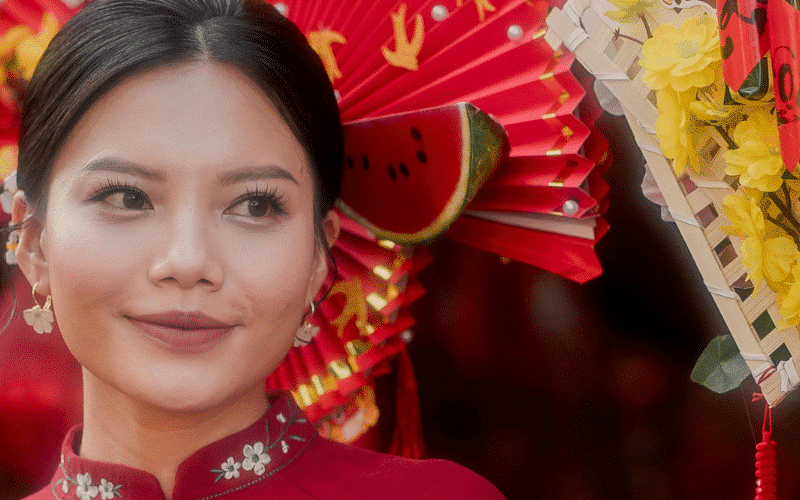Latinas Have Always Been Fashion Trendsetters: These 5 Rising Fashion Brands Are Proof
Ever wonder why that vintage look from your mom’s yearbook photos is suddenly everywhere on TikTok and even NYFW?

Maybe you’ve come across some of the latest fashion trends that resemble your mom’s closet scrolling through TikTok or at New York Fashion Week and the VMA’s, or even your favorite tia’s yearbook photos or your older cousins’ outfits from back in the day. It’s not surprising that many of today’s trends are inspired by different generations of Latinas from different neighborhoods and regions. In reality, some of these fashion looks are actually cultural statements, and for many Latinas, it’s an expression of identity and a merging of their multicultural lifestyle.
For most of us, it is a visible validation of self-acceptance and a symbol of rebelling against what is deemed as “trendy” or “acceptable” in the mainstream world.
Intentionally, many Latina-owned brands and designers are curating collections and pieces that not only fit their personal aesthetics but also represent our cultura and the trends they saw their own families and Latina idols wearing growing up. For many of us, it’s more than just a superficial form of expression; it’s our legacy and history in a world where some of us are still struggling with identity issues due to colonization, displacement, and erasure.
While the mainstream fashion world may not always give the BIPOC community the proper credit for their contributions to the industry, many emerging designers of color are breaking this status quo and celebrating their own identity regardless if it’s on trend or not. They are doing this while also creating their own opportunities to showcase their art through photoshoots, marketing campaigns, fashion shows, and collaborating with real people from the community to express themselves.
The reality is that Latinas have always been fashion trendsetters and fashion is embedded in our cultura just like our food, music, and customs. Fashion starlets like Rita Moreno, Maria Felix, Bianca Jagger, and Celia Cruz were all trailblazers in an era where most Latinas were not seen as fashion icons. However, these stylish pioneers set the tone for others to follow in their footsteps. Fast forward to the ’90s and 2000’s, fashion icons like Thalia, Paulina Rubio, Lisa “Left Eye” Lopes, Selena, Tatiana Ali, Jennifer Lopez, and Salma Hayek are all responsible for many trends still happening today.
Even though our cultura goes beyond the clothes we wear and what we buy, it’s important to validate and express our individuality. Fashion is a form of radical self-acceptance because whether we are on trend or not, we aren’t going anywhere.
Check out these rising fashion brands making their own mark on the fashion world and representing our cultura from head to toe.
Persona Shop
This Latina-owned shop is one of the only shops dedicated to curating Latina fashion trends and brands located in the heart of Los Angeles Mid-City. Most recently, they had a pop-up shop during New York Fashion Week, merging the eclectic fashion scene of the two coasts under one roof. A true celebration of what Los Angeles has to offer.
Pauchains
Pauchains is a NYC-based fashion label founded and designed by Paulina “Pauu” Montie. Its unique designs range from sustainably sourced jeans to one-of-a-kind jackets. Their recently archived collection THE MUÑECA COLLECTION brought a taste of Chicana culture to the NYC fashion world. The label is evolving and has plans to curate more bicoastal collections in the near future.
Ella Loca
Designed and made proudly in New Mexico, this rising fashion brand creates its own tendencies and fashionably takes nostalgic trends to extraordinary heights. The brand has already garnered attention from many influencers and creatives.
Equihua
Equihua, pronounced “e-KEE-wah,” has taken up space in the fashion industry, and rightfully so. Their eclectic designs like their iconic cobija coats have not only set in motion a groundbreaking trend but have created a definitive cultural statement. Designer, Brenda Equihua created “Portalwear,” which is more than street fashion, it’s a lifestyle. Equihua has opened the doors and given permission to other rising Latine designers and brands to cultivate their own aesthetics and create their own trends. You know an Equihua design when you see it and it’s gained high-fashion recognition as seen on celebrities such as Bad Bunny, Young Thug, Princess Nokia, Yara Shahidi, and more.
Selva Negra
The Los Angeles-based brand is designed ethically and from sustainably sourced materials while committing to zero waste. Although fashion is a valid form of artistic expression it is also considered one of the most harmful industries to our environment. Brands like Selva Negra, however, are ensuring they are leading by example and creating products that are carefully curated with the health of the environment and Mother Nature in mind, while also representing our colorful cultura. This size-inclusive brand has been seen all over red carpets and events this past summer.




